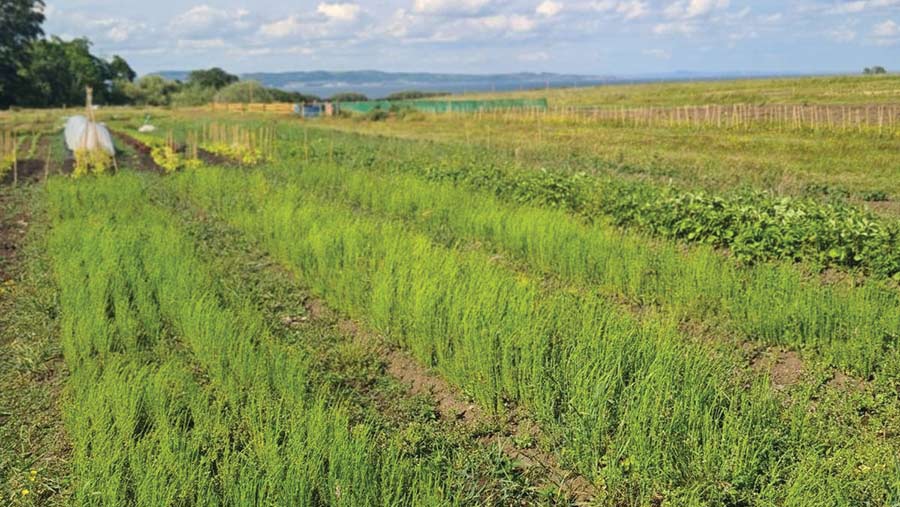Exceptional yields for new flax varieties in Scots grower trial
 Flax crop at Lauriston Farm growing 1.2m permanent beds© Innovative Farmers
Flax crop at Lauriston Farm growing 1.2m permanent beds© Innovative Farmers Scottish farmers have successfully grown new varieties of flax with yields double the industry standard and no use of artificial fertilisers, in a bid to restore Scotland’s lost linen industry.
Flax was once grown widely to support a thriving linen industry across Scotland, but declined in popularity, with 80% now grown in Europe.
With demand for biodegradable fabrics rising, the farms near Dundee, Edinburgh and Oban grew three flax varieties – Avian, Delta and Tango – in the Growing Flax for Regenerative Textiles field lab with Innovative Farmers.
See also: Why flax for fibre could reappear in arable rotations
As longer flax fibres can produce higher quality linen, the group focused on finding the best growing conditions – aiming for crops 1m in height and a total yield of 6t/ha, the industry standard in Europe.
The trial found the average heights of Avian and Delta were 78cm and 79cm, respectively, with Tango slightly lower at 64cm.
However, the crop produced exceptional yields, with Avian reaching 13t/ha at one site – Delta and Tango peaked at 12t/ha and 10t/ha, respectively. All crops were grown without artificial fertilisers.
The trial also found that the crop was ready to harvest at around 117-120 days after seeding in Scottish climates – the average for warmer areas in Europe is only slightly shorter at 100 days.
Lauriston Farm, a 100-acre organic horticulture and arable enterprise in Edinburgh, grew three 30sq m plots of each variety, without weeding after sowing.
Grower Jossie Ellis said: “We recorded encouraging results despite drought affecting the crop getting established.
“Under our conditions, the Avian variety performed well, growing to 74cm with a yield of 8t/ha.
“We’ve shown that flax is a suitable crop for a farm of our size.”
She adds that the trial shows them a way forward for producing sustainable fabric.
“As a network of farmers, we can develop flax’s commercial potential for larger-scale processing and for smaller-scale growers and craftspeople.”
The crop will be processed into yarn, with samples lab-tested by colleagues at Fantasy Fibre Mill and Heriot-Watt University for fibre length, strength and quality.
Results are expected in autumn 2024.

